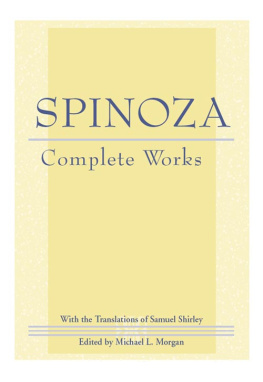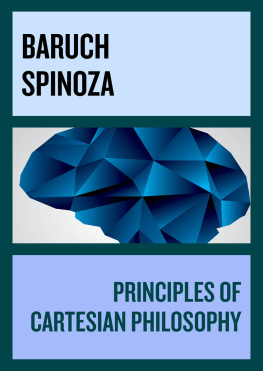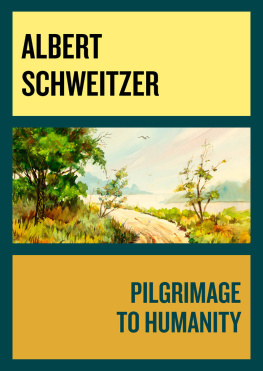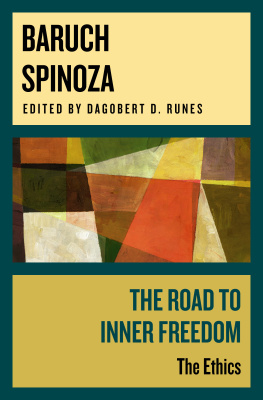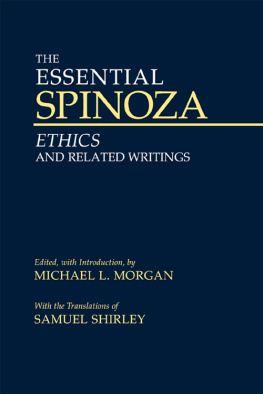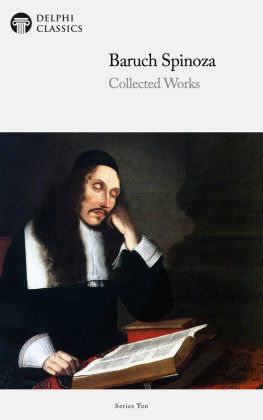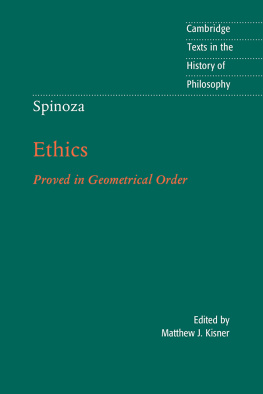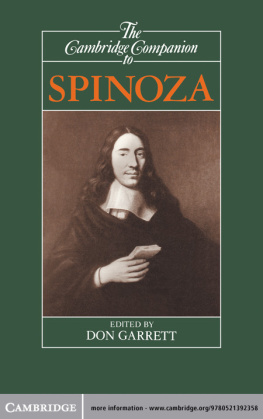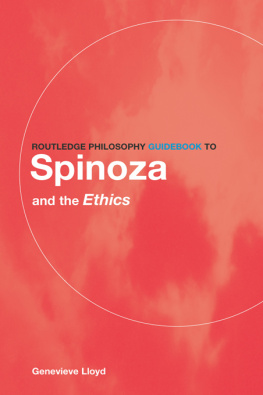Spinoza Baruch - Ethics
Here you can read online Spinoza Baruch - Ethics full text of the book (entire story) in english for free. Download pdf and epub, get meaning, cover and reviews about this ebook. genre: Science. Description of the work, (preface) as well as reviews are available. Best literature library LitArk.com created for fans of good reading and offers a wide selection of genres:
Romance novel
Science fiction
Adventure
Detective
Science
History
Home and family
Prose
Art
Politics
Computer
Non-fiction
Religion
Business
Children
Humor
Choose a favorite category and find really read worthwhile books. Enjoy immersion in the world of imagination, feel the emotions of the characters or learn something new for yourself, make an fascinating discovery.
- Book:Ethics
- Author:
- Genre:
- Rating:4 / 5
- Favourites:Add to favourites
- Your mark:
- 80
- 1
- 2
- 3
- 4
- 5
Ethics: summary, description and annotation
We offer to read an annotation, description, summary or preface (depends on what the author of the book "Ethics" wrote himself). If you haven't found the necessary information about the book — write in the comments, we will try to find it.
Ethics — read online for free the complete book (whole text) full work
Below is the text of the book, divided by pages. System saving the place of the last page read, allows you to conveniently read the book "Ethics" online for free, without having to search again every time where you left off. Put a bookmark, and you can go to the page where you finished reading at any time.
Font size:
Interval:
Bookmark:
The Project Gutenberg EBook of The Ethics, by Benedict de Spinoza
This eBook is for the use of anyone anywhere at no cost and with
almost no restrictions whatsoever. You may copy it, give it away or
re-use it under the terms of the Project Gutenberg License included
with this eBook or online at www.gutenberg.net
Title: The Ethics
Author: Benedict de Spinoza
Posting Date: May 28, 2009 [EBook #3800]
Release Date: February, 2003
First Posted: September 26, 2001
Last Updated: July 29, 2007
Language: English
*** START OF THIS PROJECT GUTENBERG EBOOK THE ETHICS ***
Produced by Tom Sharpe. HTML version by Al Haines.
| PART I | PART II | PART III | PART IV | PART V |
I. By that which is selfcaused, I mean that of which the essence involves existence, or that of which the nature is only conceivable as existent.
II. A thing is called finite after its kind, when it can be limited by another thing of the same nature; for instance, a body is called finite because we always conceive another greater body. So, also, a thought is limited by another thought, but a body is not limited by thought, nor a thought by body.
III. By substance, I mean that which is in itself, and is conceived through itself: in other words, that of which a conception can be formed independently of any other conception.
IV. By attribute, I mean that which the intellect perceives as constituting the essence of substance.
V. By mode, I mean the modifications[1] of substance, or that which exists in, and is conceived through, something other than itself.
[1] "Affectiones"
VI. By God, I mean a being absolutely infinitethat is, a substance consisting in infinite attributes, of which each expresses eternal and infinite essentiality.
ExplanationI say absolutely infinite, not infinite after its kind: for, of a thing infinite only after its kind, infinite attributes may be denied; but that which is absolutely infinite, contains in its essence whatever expresses reality, and involves no negation.
VII. That thing is called free, which exists solely by the necessity of its own nature, and of which the action is determined by itself alone. On the other hand, that thing is necessary, or rather constrained, which is determined by something external to itself to a fixed and definite method of existence or action.
VIII. By eternity, I mean existence itself, in so far as it is conceived necessarily to follow solely from the definition of that which is eternal.
ExplanationExistence of this kind is conceived as an eternal truth, like the essence of a thing, and, therefore, cannot be explained by means of continuance or time, though continuance may be conceived without a beginning or end.
I. Everything which exists, exists either in itself or in something else.
II. That which cannot be conceived through anything else must be conceived through itself.
III. From a given definite cause an effect necessarily follows; and, on the other hand, if no definite cause be granted, it is impossible that an effect can follow.
IV. The knowledge of an effect depends on and involves the knowledge of a cause.
V. Things which have nothing in common cannot be understood, the one by means of the other; the conception of one does not involve the conception of the other.
VI. A true idea must correspond with its ideate or object.
VII. If a thing can be conceived as nonexisting, its essence does not involve existence.
PROP. I. Substance is by nature prior to its modifications.
Proof.This is clear from Deff. iii. and v.
PROP. II. Two substances, whose attributes are different, have nothing in common.
Proof.Also evident from Def. iii. For each must exist in itself, and be conceived through itself; in other words, the conception of one does not imply the conception of the other.
PROP. III. Things which have nothing in common cannot be one the cause of the other.
Proof.If they have nothing in common, it follows that one cannot be apprehended by means of the other (Ax. v.), and, therefore, one cannot be the cause of the other (Ax. iv.). Q.E.D.
PROP. IV. Two or more distinct things are distinguished one from the other, either by the difference of the attributes of the substances, or by the difference of their modifications.
Proof.Everything which exists, exists either in itself or in something else (Ax. i.),that is (by Deff. iii. and v.), nothing is granted in addition to the understanding, except substance and its modifications. Nothing is, therefore, given besides the understanding, by which several things may be distinguished one from the other, except the substances, or, in other words (see Ax. iv.), their attributes and modifications. Q.E.D.
PROP. V. There cannot exist in the universe two or more substances having the same nature or attribute.
Proof.If several distinct substances be granted, they must be distinguished one from the other, either by the difference of their attributes, or by the difference of their modifications (Prop. iv.). If only by the difference of their attributes, it will be granted that there cannot be more than one with an identical attribute. If by the difference of their modificationsas substance is naturally prior to its modifications (Prop. i.),it follows that setting the modifications aside, and considering substance in itself, that is truly, (Deff. iii. and vi.), there cannot be conceived one substance different from another,that is (by Prop. iv.), there cannot be granted several substances, but one substance only. Q.E.D.
PROP. VI. One substance cannot be produced by another substance.
Proof.It is impossible that there should be in the universe two substances with an identical attribute, i.e. which have anything common to them both (Prop. ii.), and, therefore (Prop. iii.), one cannot be the cause of the other, neither can one be produced by the other. Q.E.D.
Corollary.Hence it follows that a substance cannot be produced by anything external to itself. For in the universe nothing is granted, save substances and their modifications (as appears from Ax. i. and Deff. iii. and v.). Now (by the last Prop.) substance cannot be produced by another substance, therefore it cannot be produced by anything external to itself. Q.E.D. This is shown still more readily by the absurdity of the contradictory. For, if substance be produced by an external cause, the knowledge of it would depend on the knowledge of its cause (Ax. iv.), and (by Def. iii.) it would itself not be substance.
PROP. VII. Existence belongs to the nature of substances.
Proof.Substance cannot be produced by anything external (Corollary, Prop vi.), it must, therefore, be its own causethat is, its essence necessarily involves existence, or existence belongs to its nature.
PROP. VIII. Every substance is necessarily infinite.
Proof.There can only be one substance with an identical attribute, and existence follows from its nature (Prop. vii.); its nature, therefore, involves existence, either as finite or infinite. It does not exist as finite, for (by Def. ii.) it would then be limited by something else of the same kind, which would also necessarily exist (Prop. vii.); and there would be two substances with an identical attribute, which is absurd (Prop. v.). It therefore exists as infinite. Q.E.D.
Note I.As finite existence involves a partial negation, and infinite existence is the absolute affirmation of the given nature, it follows (solely from Prop. vii.) that every substance is necessarily infinite.
Font size:
Interval:
Bookmark:
Similar books «Ethics»
Look at similar books to Ethics. We have selected literature similar in name and meaning in the hope of providing readers with more options to find new, interesting, not yet read works.
Discussion, reviews of the book Ethics and just readers' own opinions. Leave your comments, write what you think about the work, its meaning or the main characters. Specify what exactly you liked and what you didn't like, and why you think so.




